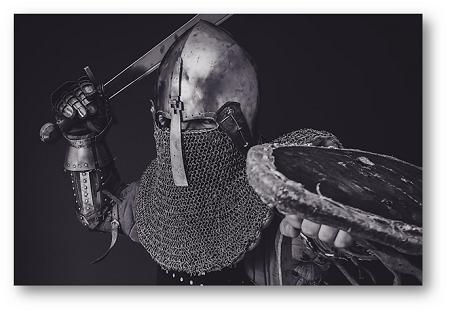Romans 7:25 – Faith's Battle
Romans 7:25 – Faith's Battle
So then, I of myself serve the law of God with my mind, but with my flesh I serve the law of sin.
Romans 7:25b

Many find the concluding words of Paul's description of the Christian struggle to be out of place, and some have even suggested that they do not belong in the context. For Paul has expressed the hope and certainty of victory in Christ. But his final words appear inconclusive, as if he had a divided personality. He appears to be attempting to make the best out of an impossible situation by dividing himself between two masters: God and sin.
However, Paul's conclusion is not out of place in the context. Rather, it functions as a realistic appraisal of the Christian struggle in the world. The old nature is to be considered as dead, but that does not mean that its influence has faded. Indeed, it proves to be a constant well of impure thoughts, desires and affections. The struggle with the old nature never ends.
For the believer, this struggle may be carried forward in good hope! Although it endures, Christ assures him that he will find continued ammunition and zeal for the battle in the holy gospel. Paul recognizes the tremendous power exerted by his flesh. He finds it to be a law that he is made captive to the law of sin that lives in his members, vs. 23. However, powerful though this law of sin may be, it cannot capture his will. Repeatedly the apostle notes that sin, in capturing him, never captures his will, cf. vss. 15, 16, 18, 19. Indeed, he finds sins root in the fact that although he wills the good, he cannot do what he wills.
Here Paul expresses the sinful nature in the way Peter experienced it. It was given to Paul to describe in words the kind of experiences that we read of especially with regard to Peter. For this was the essential point of difference between Peter and Judas. Judas did not want to follow the Lord Jesus in suffering and death. But Peter spontaneously expressed the affections of his will; "Even if I must die with you, I will not deny you," Matthew 26:35. When his flesh took over at the critical moment, he found himself in conflict with his will which had been gripped by the love of God revealed in Christ. Such is the frailty of human nature that even the slightest temptation is sufficient to cause one to fall. Broken in his spirit, Peter ran outside and wept bitterly.
Here sin has something baffling about it. Peters actions completely conflicted with his will and desires. Later in his life he went through a similar experience. He knew that God had accepted the Gentiles who turned to Him in faith, and that there was no partiality with God, Acts 10:35. And he worked for the inclusion of the Gentiles, Acts 11:5ff. But at another critical moment the flesh took over; he drew back from the Gentiles and separated himself, fearing the circumcision party, Galatians 2:11ff. Again, his actions conflicted with his will.
In this chapter, the one who was called to rebuke Peter admits that he was not any different. Sin for him has a mark of bewilderment. It's as if he asks himself, "How could I do such a thing?" And he says, "I do not understand my own actions." With heart, will, and mind, he loved the Lord, and this was firmly implanted in his being. Yet this brought a continuous struggle against the bewildering and ever-recurring power of sin.

Should not the apostle have been more positive with regard to this battle? Does he not appear indefinite? In fact, he is positive because in his heart and will he knows that he shares the free justification in Christ. He has received the forgiveness of sins out of mere grace! But he is also realistic and honest about himself. The human nature which in Christ has been broken still brings with it a constant battle.
Essentially one finds two reasons why Paul concludes the account of his own experiences in this way. He stresses the duration of the struggle. He confirms it as an enduring battle. He also reminds us of the depth of the struggle. Later he says,
We are not contending against flesh and blood, but against the principalities, against the powers, against the world rulers of this present darkness, against the spiritual hosts of wickedness in the heavenly places.Ephesians 6:12
Everyone should be watchful and constantly ready, armed for battle, and no one should be led astray by the deceitfulness of sin.
For Paul puts into words what he and Peter experienced. In giving us this united apostolic experience the Holy Spirit presents us with what is the experience of every true believer. We do not have a trifling or superficial enemy. And the Christian struggle is an enduring one. Indeed, the flesh will never win in this warfare. In principle it has been defeated through the cross of Christ, and its remaining power will be totally extinguished at the day of Christ. The flesh of sin is destined for the grave. Yet we must fight on until the day Christ comes.
And the grace of God is manifested in the way He works true sorrow for sin in our hearts. True sorrow acknowledges the bewildering power of sin and says, "How could I do such a thing?" And only with such sorrow can one find the true and lasting joy that rings forth in the words: Thanks be to God through Jesus Christ our Lord! For what hope does anyone have outside of Him?

Add new comment